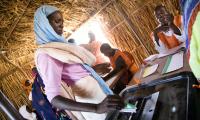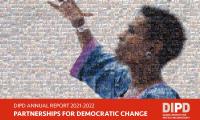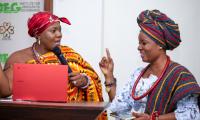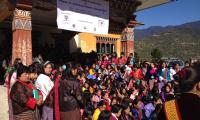First step is getting more women on the ballot paper
Ensuring women’s representation at all levels of government continues to be a struggle globally. According to UN Women, only 25% of the seats in national parliaments are held by women. The Danish political parties and DIPD are working to strengthen women’s representation specifically through partnerships in Bhutan, Burkina Faso, Malawi, Myanmar, Nepal, Palestine, and Tanzania.

Ensuring women’s representation at the ballot box is one of DIPD's focus areas when working towards female representation - a process that starts at the party level.
In Burkina Faso a quota for women’s representation on the party lists on the ballots has been implemented, but the quota is mostly not upheld by political parties in Burkina Faso.
The Danish Social Democratic Party (SDP) worked with their partner People’s Movement for Progress (MPP) to ensure a higher level of representation of women on the party lists both at the provincial and national level by going through the lists and figuring out ways to include more women leading up to the election in 2020.
At the same time, both the SDP’s and DIPD’s partner Centre for Democratic Governance (CGD) undertook capacity building training for women, which resulted in several of the participating women being elected to office and one woman becoming a minister. However, this year's military coup in Burkina Faso has stopped the democratic development in the country.
High level representation
The increase in representation of women at the highest level has not only been seen in Burkina Faso. In this project period, we have also seen women rising to the top in Nepal. The first female Chief Minister was elected after many years of being a part of the DIPD partnership regarding the multiparty platform, the Joint Mechanism for Political Party Support. Four other women have been elected as ministers and many more were elected to higher offices.
In Nepal DIPD has focused on strengthening women’s leadership skills while at the same time working to promote gender equality policies. A multipronged strategy that has resulted in several Nepalese parties conducting gender audits and women feeling more secure in running for leadership positions.
Courage to run for office
Empowering women to run for political office is essential in strengthening women’s representation. In Bhutan, the DIPD partner Bhutan Network for Empowering Women (BNEW) has succeeded in training more female role models and in increasing the support for female leadership.
This has been undertaken to counter the gender stereotypes women face and to convince the general population that women should run for office as much as men. In the campaign to make women more visible there has also been intense work done to ensure that journalists are being educated and made aware of gender perspectives.
Increasing the representation of women by educating role models has also been at the core of the work in Tanzania. The Danish Conservative Party has worked with the parti CHADEMA to empower women and give them concrete tools and skills for their political leadership journey; this has worked to greatly increase the number of women contesting in the 2020 election as CHADEMA candidates. In 2020, 69 women stood in the general election as CHADEMA candidates, whereas in 2015 there were only 12 CHADEMA women candidates.
The work continues
Still, making sure that women can run for office is not an easy task. In times of insecurity or in times of a pandemic the space for women to participate in politics shrinks and for some political parties it then becomes less of a priority to focus on women’s representation.
Gender equality remains a problem, but small steps are being made to ensure equal representation. Therefore, it is important to maintain the focus on political parties and their role in ensuring gender equality; the first step is getting more women on the ballot paper.



